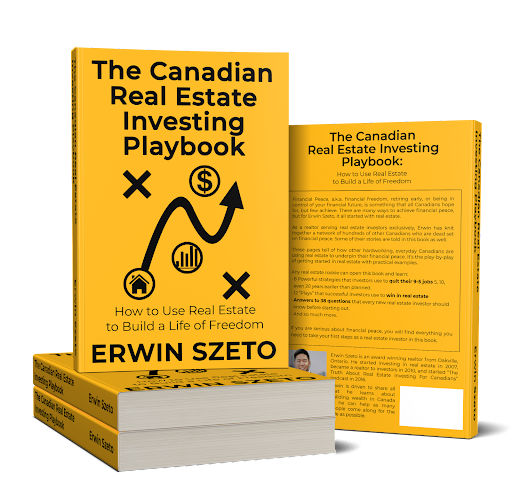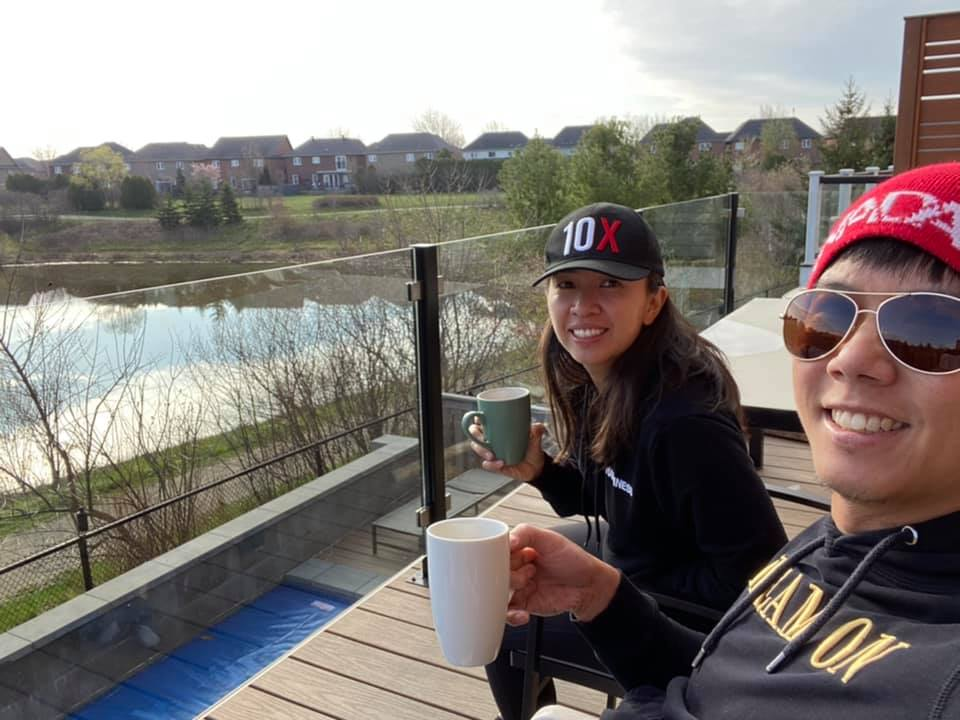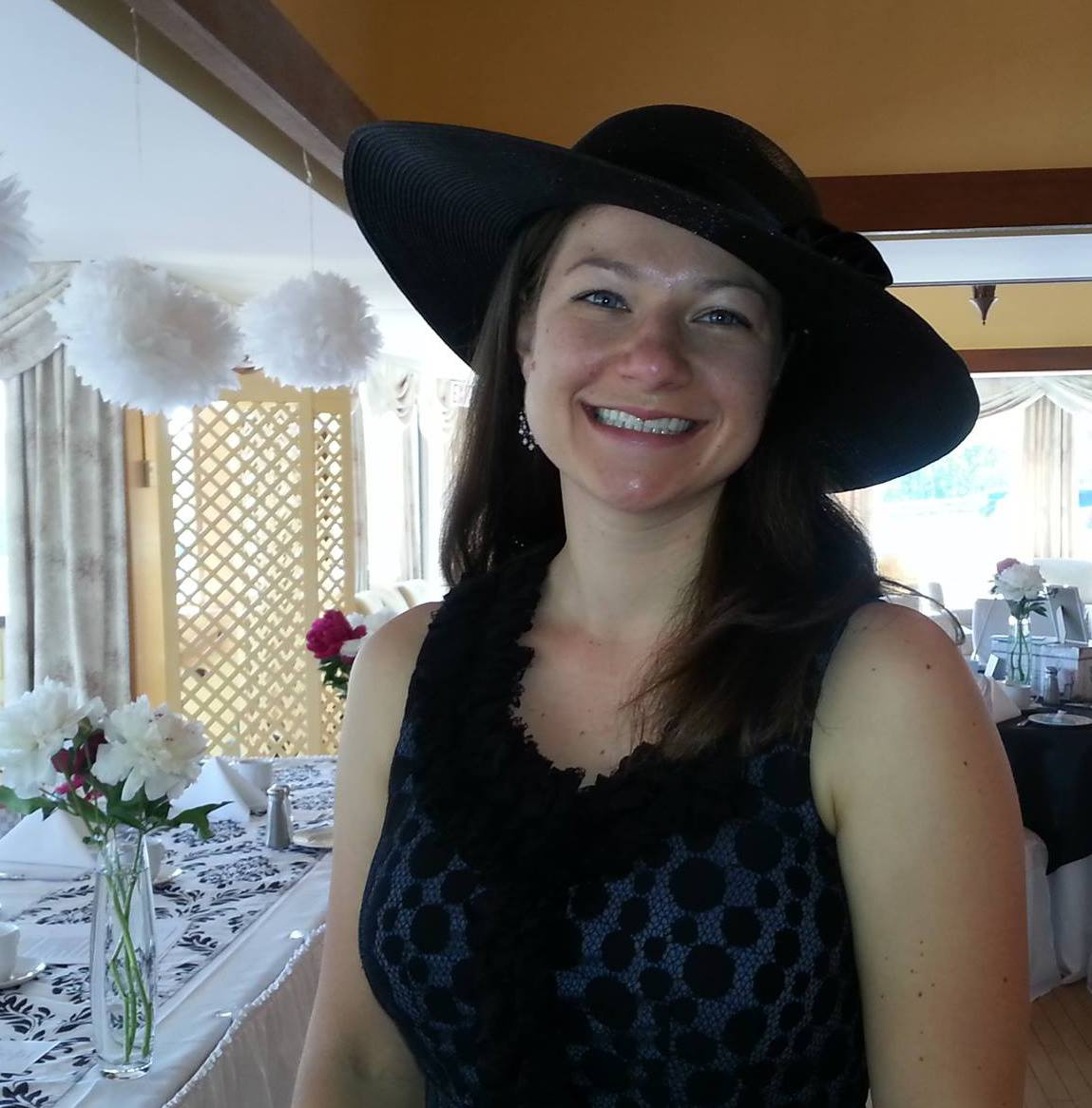New FREE BOOK teaches 8 powerful real estate investing strategies Average Canadians are using to quit their jobs 5, 10, even 20 years earlier than planned.

New FREE BOOK teaches 8 powerful real estate investing strategies Average Canadians are using to quit their jobs 5, 10, even 20 years earlier than planned.
So, how do you quit your job with passive income from real estate?
From: Erwin Szeto
Oakville, ON
Tell me if this sounds familiar...
If your upbringing was anything like mine you were taught that if you wanted success, you had to go to university…
You had to get a job at a big company with a good pension and lots of room for growth…
You had to work there for 30 - 40 years to retire comfortably…
Enduring the office politics...
Shoving down the dread every Sunday evening...
Ignoring that you feel trapped...
Gritting your teeth when losing time with your children...
You worked your butt off through university, through your 20’s, maybe you got a few promotions, maybe you even have a bigger salary now…
But your time is not your own...
So, how do you quit your job with passive income from real estate?
If you’re anything like me, you probably started looking for a solution to the 9-5 trap as soon as you got out of university.

Out of university, I got a job with one of the world’s largest tech companies. I had my career path laid out for me.
Of course as a young man, I thought I could beat the stock market. I had a couple rental properties as well, but my confidence was in stocks.
Then the credit crisis hit in 2007. 40% of my portfolio was wiped out. The rentals however, did just fine. That’s when I started to realize the true power of real estate.
Eventually I quit my job to invest in real estate full time.
Here are some friends and colleagues of mine who have found freedom through real estate as well:

Evelyn Lamarsh loves her 9-5. She didn’t need a solution for her job. As an occupational therapist, she’s truly making a difference in people’s lives on a daily basis. Yet, when she was young, she still had the foresight to plan ahead. Her early action meant that her husband was able to retire in his 30’s from being an auto mechanic.

It was the same for my friend and client, Joe Costanza. He was all fired up to become an architect. Then he actually started working for an architectural firm and instantly knew he needed a way out. He was only 24 when he found the solution. Now he’s on his way to retiring before many of us even get started.

For James Maggs, another friend and colleague, he stayed at his high paying corporate job for a while. A few promotions and he thought he was on the right track. He thought the dread he felt every morning on his commute to work was normal, just something everyone was supposed to deal with. Then he found the solution to the dread. Now, James doesn’t have a commute. And he’s tripled his old corporate income.
What would you do with 5, 10, even 15 extra years of retirement?
James, Joe, Evelyn and I all started in the same spot…
Bewildered, yet determined.
We took baby steps, scared and uncertain. And it’s paid off.
Evelyn and Mike go out on their new yacht (that was paid for by their rental properties) any time they want.
Joe is now a full time real estate investor. He was laid off from his architecture job and decided not to go back. Real estate gave him that freedom.
James sets his own hours, goes to his vacation condo in Costa Rica as often as possible, and only works because he enjoys what he does.
My children have their own rental properties already. University tuition and down payments for their own homes are covered, and they’re not even 10 years old yet.
Real estate is a proven “get rich slow” scheme.
How much easier would it be to endure your commute, the office politics, and the dread, if you knew that your safe exit was coming soon?
So how do you get started as a real estate investor?
Education

We’ve read books, taken courses, gone to workshops and weekend events, and listened to hours and hours of podcasts.
Even after all the reading, I remember starting out and feeling so lost. It is intimidating to start taking steps as a real estate investor.
Now, after 10+ years of buying and selling rental properties, after helping hundreds of my clients buy investment properties, I compiled everything I wish I’d known starting out.
All of the questions, all of the worries, all of the insecurities, I lay it all out in a new book, “The Canadian Real Estate Investing Playbook.”

What’s in “The Canadian Real Estate Investing Playbook”?
This book is a shortcut. I know, I know. Shortcuts are bad. Then think of it as a guide to the rules and tactics to successfully play the game of real estate.
I’ve seen many investors start out on their own, with very little guidance. They buy a property without knowing if it’s a good deal or not. They sign leases with tenants not understanding how to properly screen for red flags.
Then they come to me because their newly purchased duplex is actually illegal and the city demands they turn it back into a single family home.
Or their new tenants, who seemed like decent people, have destroyed the property and are refusing to leave.
That’s the cost of not having proper guidance when you start.
It’s like stepping onto the field, thinking you can play the game without any training or coaching. The opponent is life. And if you’re not prepared, it can hurt. Bad.

This book introduces you to the strategies and tactics I’ve used, my coaches use, and hundreds of our clients use on a daily basis to win in this game of real estate.
-
Get started on the right foot, avoiding common mistakes new real estate investors make by asking (and answering) questions newbies don’t know they should be asking.
-
By-the-numbers breakdowns of real life deals so you can see how real estate investing plays out with empirical certainty
-
Unveil the relationship between real estate professionals and their role throughout each transaction so you know what their motivations are and can be sure they have your best interests at heart.
-
Learn how to tell a good deal from a bad deal so your first investment doesn’t turn into a disaster.
-
Stories from real people who are still buying real estate in Ontario, how they got started, the mistakes they made, how they recovered and found success.
-
The ins and outs of each real estate investing strategy with real life examples so you can evaluate which strategy is right for you to start with.
-
Where to find money, how money flows in real estate, what makes money and what loses money so you’re not intimidated by the high dollar figures.
-
A clear direction at the end so you know how to use all of this new information and take your first steps as a real estate investor

The 8 real estate investing strategies introduced in this book:
Each strategy has its pros and cons. Many investors start out with one strategy, but settle on another. It takes time and experience to find what works best for you. But it helps to know your options.
-
Single Family and Condo Rentals
-
Legal Secondary Suites (Duplex Conversions)
-
Rent-to-Own
-
Multi-Family Apartment Buildings
-
Short-Term Vacation Rentals
-
Student Rentals
-
Small Scale Developments
-
Flipping Houses
12 “Plays” you learn about in the Canadian Real Estate Investing Playbook
-
How to buy a house and let someone else pay the mortgage
-
How to turn 1 property into 2, 2 properties into 4, and on and on…
-
How to make the interest on your personal home tax deductible by investing in real estate
-
How to use your friends and family as the bank and help them make money too
-
How to purchase a property using the seller’s money
-
How to turn 1 house into 2 units and get your money back in less than a year.
-
How to profit 3 different ways from 1 property
-
How to let the CMHC pay for your next property and multiply your income
-
How to make a year’s worth of rent in less than 8 months
-
How to find “recession proof” investments
-
How to build on “free” land
-
How to make an extra $30,000 in less than 6 months
38 questions this book answers that every successful real estate investor asks when they’re just starting out...
- What’s the best city to invest in?
-
What makes a city a good place to invest in? (HINT: There are 8 important factors to evaluate.)
-
What real estate investing strategy should I start with?
-
Is it worth it to invest in single family homes?
-
How do you increase the rental income each month?
-
Are Condos a good investment?
-
What do I do if I buy a house with an illegal apartment unit?
-
How do you stay on the city’s good side when converting a home into a duplex?
-
How do you avoid nightmare tenants?
-
What happens when someone turns out to be a nightmare tenant?
-
Are student rentals worth it?
-
What common problems should I be aware of when buying and managing student rentals?
-
9 questions to ask before buying a student rental
-
Is financing and insuring a student rental just like financing and insuring a single family home?
-
Is it safe to invest in Short Term Rentals (ie. AirBnB)?
-
What by-laws do I need to watch out for if I want to by a short term rental?
-
How is managing a short term rental different from managing a single family home?
-
How do I start buying apartment buildings?
-
10 questions to ask before buying an apartment building.
-
What are the 2 different ways to finance the purchase of an apartment building
-
Is Rent-to-Own a scam?
-
What are the 4 ways to make money with RTOs?
-
What do you look for in an RTO property?
-
What do you look for in an RTO Tenant?
-
Renovating houses sounds like fun, why don’t I just flip houses?
-
How do I find and win deals?
-
How do I estimate reno costs and calculate my return on investment?
-
What does a “small scale” development look like?
-
How do I build houses on “free” land?
-
How do I finance a house purchase without a bank?
-
How do I use my home to fund my first investment property?
-
How do I deduct interest on my investment property mortgage?
-
What is a “Power Team” and why are they that important?
-
How do I know who to trust when looking for lawyers, mortgage brokers, real estate agents and other professionals?
-
How do I calculate the cashflow on a property?
-
How do I project the ROI of a property after a year?
-
After learning all of this… Where do I start?
-
What has COVID-19 done to real estate investing?

Now, you are probably thinking, “I can’t learn everything there is to know about real estate investing from one book…”
... And you’re right.
The Canadian Real Estate Investing Playbook is your introduction to the strategies I’ve used and my friends have used to finally quit their 9-5 job and do what they love.
Use this book as a primer. It will introduce you to the terminology and concepts you need to understand to be a successful real estate investor.
It’s overwhelming at first. So I want to break this down step-by-step, piece-by-piece for you.
You may not even finish the book. You might read the chapter on legal secondary suites, hear Joe Costanza’s story, and get really excited to learn more about that specific strategy.
If that’s the case, then this book has succeeded. The point isn’t for you to learn everything. It’s for you to find the path that excites you most and gets you moving towards taking your first steps as a real estate investor.
But it’s free… What’s the catch?
Nothing is truly free, right?
Right.
Real estate is a lot of work.
This isn’t a get rich quick scheme. It’s a proven method to get rich slowly.
You’ll read all about it from the many stories from friends and clients in this book.
Looking back at the last 10 years, it’s incredible to see how far I’ve come in my own personal investing journey. But it didn’t happen overnight.
There were a lot of mistakes along the way and a lot of mis-fires, moments when I thought I found my path, but it never panned out.
If this book helps you avoid even one mistake, that could save you thousands of dollars. If I can help you find your path in 3 years instead of 4, that’s a win.
This book is free because real estate will demand a lot from you and we need all the help we can get. But if you’re willing to invest the time and money necessary to make it work, then you will be richly rewarded for it.

This is a truly limited offer, so claim your download now before it gets taken down…
“The Canadian Real Estate Investing Playbook” will launch on Amazon soon and I won’t be able to offer it for free like this anymore. So fill out the form below, claim your download now, and take your first steps as a real estate investor.

Thank you for taking the time to read this and I hope you enjoy the book.
Building wealth together,
Erwin Szeto
P.S. In case you’re one of those people (like me) who just skips to the end of the letter, here’s the deal:
I’m sending you a download of my new book, “The Canadian Real Estate Investing Playbook” for free.
No catch. No gimmicks.
Just pure information to help you take your first steps as a real estate investor.
Sign up below to claim your free download now.
So, how do you quit your job with passive income from real estate?
From: Erwin Szeto
Oakville, ON
Tell me if this sounds familiar...
If your upbringing was anything like mine you were taught that if you wanted success, you had to go to university…
You had to get a job at a big company with a good pension and lots of room for growth…
You had to work there for 30 - 40 years to retire comfortably…
Enduring the office politics...
Shoving down the dread every Sunday evening...
Ignoring that you feel trapped...
Gritting your teeth when losing time with your children...
You worked your butt off through university, through your 20’s, maybe you got a few promotions, maybe you even have a bigger salary now…
But your time is not your own...
So, how do you quit your job with passive income from real estate?
If you’re anything like me, you probably started looking for a solution to the 9-5 trap as soon as you got out of university.

Out of university, I got a job with one of the world’s largest tech companies. I had my career path laid out for me.
Of course as a young man, I thought I could beat the stock market. I had a couple rental properties as well, but my confidence was in stocks.
Then the credit crisis hit in 2007. 40% of my portfolio was wiped out. The rentals however, did just fine. That’s when I started to realize the true power of real estate.
Eventually I quit my job to invest in real estate full time.
Here are some friends and colleagues of mine who have found freedom through real estate as well:

Evelyn Lamarsh loves her 9-5. She didn’t need a solution for her job. As an occupational therapist, she’s truly making a difference in people’s lives on a daily basis. Yet, when she was young, she still had the foresight to plan ahead. Her early action meant that her husband was able to retire in his 30’s from being an auto mechanic.

It was the same for my friend and client, Joe Costanza. He was all fired up to become an architect. Then he actually started working for an architectural firm and instantly knew he needed a way out. He was only 24 when he found the solution. Now he’s on his way to retiring before many of us even get started.

For James Maggs, another friend and colleague, he stayed at his high paying corporate job for a while. A few promotions and he thought he was on the right track. He thought the dread he felt every morning on his commute to work was normal, just something everyone was supposed to deal with. Then he found the solution to the dread. Now, James doesn’t have a commute. And he’s tripled his old corporate income.
What would you do with 5, 10, even 15 extra years of retirement?
James, Joe, Evelyn and I all started in the same spot…
Bewildered, yet determined.
We took baby steps, scared and uncertain. And it’s paid off.
Evelyn and Mike go out on their new yacht (that was paid for by their rental properties) any time they want.
Joe is now a full time real estate investor. He was laid off from his architecture job and decided not to go back. Real estate gave him that freedom.
James sets his own hours, goes to his vacation condo in Costa Rica as often as possible, and only works because he enjoys what he does.
My children have their own rental properties already. University tuition and down payments for their own homes are covered, and they’re not even 10 years old yet.
Real estate is a proven “get rich slow” scheme.
How much easier would it be to endure your commute, the office politics, and the dread, if you knew that your safe exit was coming soon?
So how do you get started as a real estate investor?
Education

We’ve read books, taken courses, gone to workshops and weekend events, and listened to hours and hours of podcasts.
Even after all the reading, I remember starting out and feeling so lost. It is intimidating to start taking steps as a real estate investor.
Now, after 10+ years of buying and selling rental properties, after helping hundreds of my clients buy investment properties, I compiled everything I wish I’d known starting out.
All of the questions, all of the worries, all of the insecurities, I lay it all out in a new book, “The Canadian Real Estate Investing Playbook.”

What’s in “The Canadian Real Estate Investing Playbook”?
This book is a shortcut. I know, I know. Shortcuts are bad. Then think of it as a guide to the rules and tactics to successfully play the game of real estate.
I’ve seen many investors start out on their own, with very little guidance. They buy a property without knowing if it’s a good deal or not. They sign leases with tenants not understanding how to properly screen for red flags.
Then they come to me because their newly purchased duplex is actually illegal and the city demands they turn it back into a single family home.
Or their new tenants, who seemed like decent people, have destroyed the property and are refusing to leave.
That’s the cost of not having proper guidance when you start.
It’s like stepping onto the field, thinking you can play the game without any training or coaching. The opponent is life. And if you’re not prepared, it can hurt. Bad.

This book introduces you to the strategies and tactics I’ve used, my coaches use, and hundreds of our clients use on a daily basis to win in this game of real estate.
-
Get started on the right foot, avoiding common mistakes new real estate investors make by asking (and answering) questions newbies don’t know they should be asking.
-
By-the-numbers breakdowns of real life deals so you can see how real estate investing plays out with empirical certainty
-
Unveil the relationship between real estate professionals and their role throughout each transaction so you know what their motivations are and can be sure they have your best interests at heart.
-
Learn how to tell a good deal from a bad deal so your first investment doesn’t turn into a disaster.
-
Stories from real people who are still buying real estate in Ontario, how they got started, the mistakes they made, how they recovered and found success.
-
The ins and outs of each real estate investing strategy with real life examples so you can evaluate which strategy is right for you to start with.
-
Where to find money, how money flows in real estate, what makes money and what loses money so you’re not intimidated by the high dollar figures.
-
A clear direction at the end so you know how to use all of this new information and take your first steps as a real estate investor
The 8 real estate investing strategies introduced in this book:
Each strategy has its pros and cons. Many investors start out with one strategy, but settle on another. It takes time and experience to find what works best for you. But it helps to know your options.
-
Single Family and Condo Rentals
-
Legal Secondary Suites (Duplex Conversions)
-
Rent-to-Own
-
Multi-Family Apartment Buildings
-
Short-Term Vacation Rentals
-
Student Rentals
-
Small Scale Developments
-
Flipping Houses
12 “Plays” you learn about in the Canadian Real Estate Investing Playbook
-
How to buy a house and let someone else pay the mortgage
-
How to turn 1 property into 2, 2 properties into 4, and on and on…
-
How to make the interest on your personal home tax deductible by investing in real estate
-
How to use your friends and family as the bank and help them make money too
-
How to purchase a property using the seller’s money
-
How to turn 1 house into 2 units and get your money back in less than a year.
-
How to profit 3 different ways from 1 property
-
How to let the CMHC pay for your next property and multiply your income
-
How to make a year’s worth of rent in less than 8 months
-
How to find “recession proof” investments
-
How to build on “free” land
-
How to make an extra $30,000 in less than 6 months
38 questions this book answers that every successful real estate investor asks when they’re just starting out...
- What’s the best city to invest in?
-
What makes a city a good place to invest in? (HINT: There are 8 important factors to evaluate.)
-
What real estate investing strategy should I start with?
-
Is it worth it to invest in single family homes?
-
How do you increase the rental income each month?
-
Are Condos a good investment?
-
What do I do if I buy a house with an illegal apartment unit?
-
How do you stay on the city’s good side when converting a home into a duplex?
-
How do you avoid nightmare tenants?
-
What happens when someone turns out to be a nightmare tenant?
-
Are student rentals worth it?
-
What common problems should I be aware of when buying and managing student rentals?
-
9 questions to ask before buying a student rental
-
Is financing and insuring a student rental just like financing and insuring a single family home?
-
Is it safe to invest in Short Term Rentals (ie. AirBnB)?
-
What by-laws do I need to watch out for if I want to by a short term rental?
-
How is managing a short term rental different from managing a single family home?
-
How do I start buying apartment buildings?
-
10 questions to ask before buying an apartment building.
-
What are the 2 different ways to finance the purchase of an apartment building
-
Is Rent-to-Own a scam?
-
What are the 4 ways to make money with RTOs?
-
What do you look for in an RTO property?
-
What do you look for in an RTO Tenant?
-
Renovating houses sounds like fun, why don’t I just flip houses?
-
How do I find and win deals?
-
How do I estimate reno costs and calculate my return on investment?
-
What does a “small scale” development look like?
-
How do I build houses on “free” land?
-
How do I finance a house purchase without a bank?
-
How do I use my home to fund my first investment property?
-
How do I deduct interest on my investment property mortgage?
-
What is a “Power Team” and why are they that important?
-
How do I know who to trust when looking for lawyers, mortgage brokers, real estate agents and other professionals?
-
How do I calculate the cashflow on a property?
-
How do I project the ROI of a property after a year?
-
After learning all of this… Where do I start?
-
What has COVID-19 done to real estate investing?
Now, you are probably thinking, “I can’t learn everything there is to know about real estate investing from one book…”
... And you’re right.
The Canadian Real Estate Investing Playbook is your introduction to the strategies I’ve used and my friends have used to finally quit their 9-5 job and do what they love.
Use this book as a primer. It will introduce you to the terminology and concepts you need to understand to be a successful real estate investor.
It’s overwhelming at first. So I want to break this down step-by-step, piece-by-piece for you.
You may not even finish the book. You might read the chapter on legal secondary suites, hear Joe Costanza’s story, and get really excited to learn more about that specific strategy.
If that’s the case, then this book has succeeded. The point isn’t for you to learn everything. It’s for you to find the path that excites you most and gets you moving towards taking your first steps as a real estate investor.
But it’s free… What’s the catch?
Nothing is truly free, right?
Right.
Real estate is a lot of work.
This isn’t a get rich quick scheme. It’s a proven method to get rich slowly.
You’ll read all about it from the many stories from friends and clients in this book.
Looking back at the last 10 years, it’s incredible to see how far I’ve come in my own personal investing journey. But it didn’t happen overnight.
There were a lot of mistakes along the way and a lot of mis-fires, moments when I thought I found my path, but it never panned out.
If this book helps you avoid even one mistake, that could save you thousands of dollars. If I can help you find your path in 3 years instead of 4, that’s a win.
This book is free because real estate will demand a lot from you and we need all the help we can get. But if you’re willing to invest the time and money necessary to make it work, then you will be richly rewarded for it.
This is a truly limited offer, so claim your download now before it gets taken down…
“The Canadian Real Estate Investing Playbook” will launch on Amazon soon and I won’t be able to offer it for free like this anymore. So fill out the form below, claim your download now, and take your first steps as a real estate investor.

Thank you for taking the time to read this and I hope you enjoy the book.
Building wealth together,
Erwin Szeto
P.S. In case you’re one of those people (like me) who just skips to the end of the letter, here’s the deal:
I’m sending you a download of my new book, “The Canadian Real Estate Investing Playbook” for free.
No catch. No gimmicks.
Just pure information to help you take your first steps as a real estate investor.
Sign up below to claim your free download now.
Copyrights 2022. ECRB Investments. All Rights Reserved.